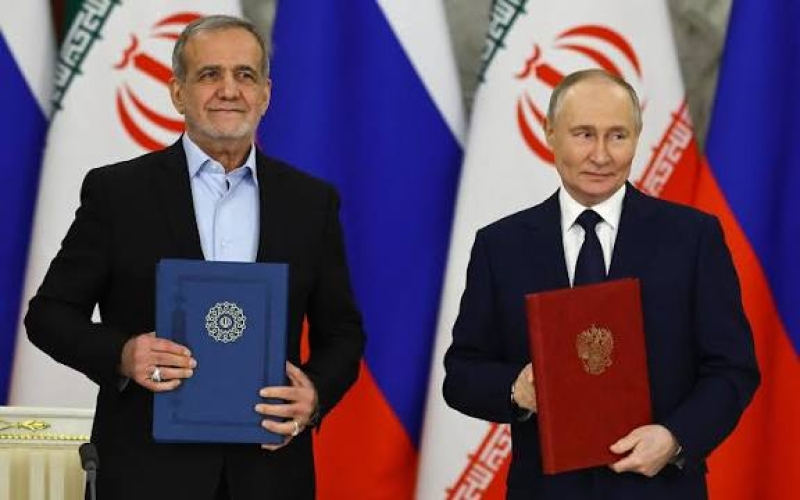- Tarique Rahman returns home amid rapturous reception |
- Home After 17 Years: Tarique Returns to Gulshan Residence |
- Tarique Calls for United Effort to Build a Safe Bangladesh |
- Tarique leaves for 300 feet area from airport |
- BNP top leaders welcome Tarique Rahman on homecoming |
Russia, Iran Sign Nuclear Deal Ahead of Sanctions Deadline

Russia and Iran have signed a memorandum of understanding to build small nuclear power plants in Iran, as Tehran faces the prospect of renewed international sanctions over its nuclear programme.
The agreement was signed Wednesday in Moscow by Rosatom chief Alexei Likhachev and Iran’s top nuclear official and Vice President Mohammad Eslami, who described it as a “strategic project.”
Earlier this week, Eslami told Iranian state media that Tehran plans to build eight nuclear plants as part of its goal to generate 20 gigawatts of nuclear energy capacity by 2040. Iran currently operates only one nuclear facility — the Russian-built Bushehr plant in the south — with a capacity of about 1 gigawatt.
The development comes as the United Nations Security Council (UNSC) last week voted against permanently lifting sanctions on Iran, setting the stage for their automatic reimposition by September 28 unless a new deal is reached. Russia was among four countries that opposed restoring sanctions.
Iran rejected the UNSC move, warning that the resumption of sanctions would “effectively suspend” its cooperation with the International Atomic Energy Agency (IAEA). The vote followed a 30-day dispute process triggered in August by the United Kingdom, France and Germany — the E3 — accusing Tehran of breaching its nuclear commitments.
The E3 allege Iran has amassed a uranium stockpile more than 40 times above the limit set under the 2015 nuclear accord, which former U.S. President Donald Trump abandoned in 2018 before reimposing sanctions. Tehran argues it only expanded enrichment after Washington violated the deal.
Fresh sanctions would freeze Iranian assets abroad, block arms sales to Tehran, and restrict its ballistic missile programme. While denying any pursuit of nuclear weapons, Iranian leaders insist on their right to peaceful nuclear energy.
Addressing the UN General Assembly on Wednesday, President Masoud Pezeshkian reiterated that Iran “will never seek a nuclear bomb.” A day earlier, Supreme Leader Ayatollah Ali Khamenei dismissed any direct talks with Washington, calling negotiations with the United States “a sheer dead end.”
Tensions over Iran’s nuclear programme have intensified in recent months. In June, Israel launched a 12-day conflict with Iran, during which Israeli and U.S. forces targeted several of Tehran’s nuclear facilities, reports UNB.

